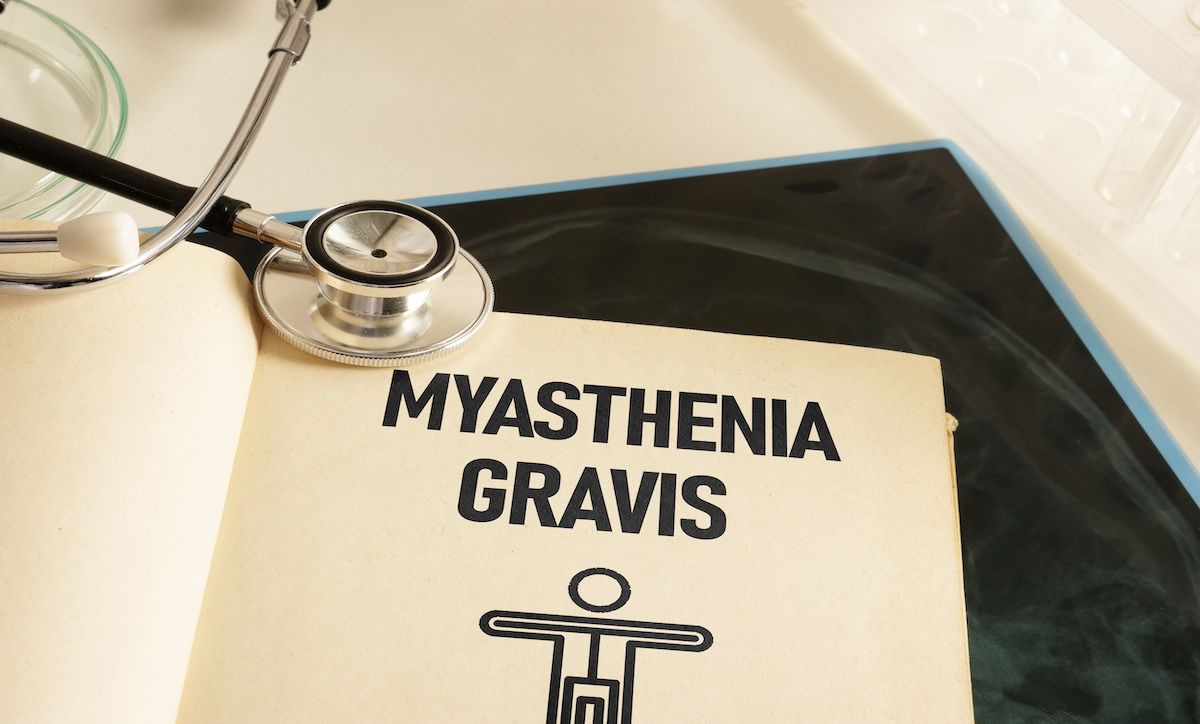- Center on Health Equity & Access
- Clinical
- Health Care Cost
- Health Care Delivery
- Insurance
- Policy
- Technology
- Value-Based Care
Extension Trial Shows Zilucoplan Safe and Effective for MG at 60 Weeks
COVID-19 and worsening myasthenia gravis (MG) were the most common treatment-emergent adverse events, the study found.
New long-term data show that the generalized myasthenia gravis (gMG) therapy zilucoplan (Zilbrysq) is well tolerated and effective in patients with mild to severe cases of MG, even after more than a year.
The data come from a phase 3 open-label extension study that was published in Therapeutic Advances in Neurological Disorders.1
Myasthenia gravis | Image Credit: © Andrii - stock.adobe.com

Zilucoplan is a small (15-amino-acid) macrocyclic peptide C5 inhibitor that is self-administered subcutaneously once per day. In the pivotal phase 3 randomized controlled RAISE trial (NCT04115293), it led to rapid improvement for patients with acetylcholine receptor autoantibody-positive (AChR+) gMG compared with placebo, and those improvements were sustained throughout the study’s 12 weeks.2 The therapy also had a favorable safety profile, the investigators found, with the most common treatment-emergent adverse event (TEAE) being injection-site bruising.
The new study expands on those findings, tracking 200 patients who were previously enrolled in a phase 2 or phase 3 study of zilucoplan.1 Those who were initially randomized into the intervention group continued using zilucoplan at a dosage of 0.3 mg/kg once daily; those who were originally enrolled in the placebo group switched to zilucoplan at the same dosage. At baseline, the patients in the open-label extension study had a mean age of 53.3 years.
After a median exposure to zilucoplan of 1.2 years (range, 0.11-4.45 years), the investigators found that TEAEs were common but were mostly manageable. Overall, 188 patients (94%) reported a TEAE, and 64 patients (32%) had a TEAE that was categorized as serious. The most common TEAEs were worsening MG (52 patients; 26%) and COVID-19 (49 patients; 25%). Those were also the most common serious TEAEs, including 4 patients with pneumonia tied to COVID-19. Four deaths were reported in the study population, but none were considered to be treatment related.
The investigators noted that less than half (42%) of the 52 patients who had worsening MG were deemed by investigators to warrant rescue therapy, “suggesting that investigators were comfortable with a less aggressive treatment approach to manage disease fluctuations in the majority of patients.”
They added that the use of rescue therapy decreased as the patient’s time on zilucoplan increased, “thus showing a positive effect of zilucoplan on the prevention of unpredictable gMG disease fluctuations.”
As in the earlier study, the most common treatment-related TEAE was injection-site bruising, although that was only reported in 12 patients. One patient experienced an infection at the injection site, but the investigators said the site of that infection indicated that the patient was not injecting the drug at the recommended site. One patient also reported a case of esophagitis that was considered to be treatment related.
Turning to efficacy data, the study found that most patients continued to benefit from zilucoplan over a long period. Those who received the 0.3 kg/mg dose of zilucoplan in their parent study had a least squares mean change from their double-blind baseline of –6.06 points (95% CI, –7.09 to –5.03) on the MG Activities of Daily Living scale, and those were sustained at week 60, the investigators found. In patients who took placebo in the parent study, the investigators found a rapid first-week improvement, reaching a least squares mean change of –6.46 points (95% CI, –8.19 to –4.72) by week 24 (12 weeks after switching from placebo). Those results were also sustained at 60 weeks.
The new data place zilucoplan alongside other new MG therapies in demonstrating long-term efficacy. Positive long-term data for eculizumab (Ultomiris) were published last year, and eculizumab (Soliris) was found to be safe and effective for up to 3 years in a study published in 2019.3,4
The investigators noted the new zilucoplan data also showed improved patient fatigue, and they said the once-daily subcutaneous administration was a convenient method for patients that also reduced “peaks and troughs” that may be associated with less-frequent infusions of other medications.1
Overall, the authors said these data are clinically meaningful and promising.
“These data are in line with the rapid and clinically meaningful improvements observed after 12 weeks of zilucoplan treatment in RAISE,” they wrote. They added that the extension trial is ongoing, and further long-term data will be available at a later date.
References:
- Howard JF Jr, Bresch S, Farmakidis C, et al. Long-term safety and efficacy of zilucoplan in patients with generalized myasthenia gravis: interim analysis of the RAISE-XT open-label extension study. Ther Adv Neurol Disord. 2024;17:17562864241243186. doi:10.1177/17562864241243186
- Howard JF Jr, Bresch S, Genge A, et al. Safety and efficacy of zilucoplan in patients with generalised myasthenia gravis (RAISE): a randomised, double-blind, placebo-controlled, phase 3 study. Lancet Neurol. 2023;22(5):395-406. doi:10.1016/S1474-4422(23)00080-7
- Meisel A, Annane D, Vu T, et al. Long-term efficacy and safety of ravulizumab in adults with anti-acetylcholine receptor antibody-positive generalized myasthenia gravis: results from the phase 3 CHAMPION MG open-label extension. J Neurol. 2023;270(8):3862-3875. doi:10.1007/s00415-023-11699-x
- Muppidi S, Utsugisawa K, Benatar M, et al. Long-term safety and efficacy of eculizumab in generalized myasthenia gravis. Muscle Nerve. 2019;60(1):14-24. doi:10.1002/mus.26447
